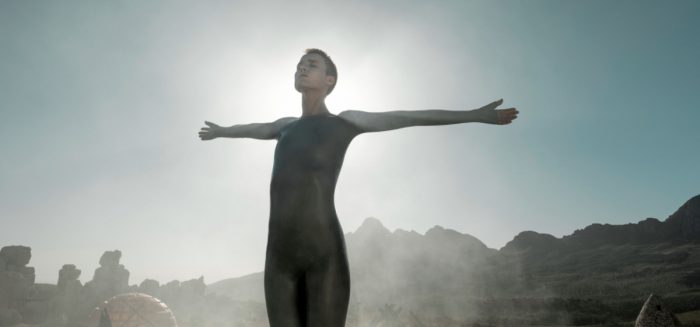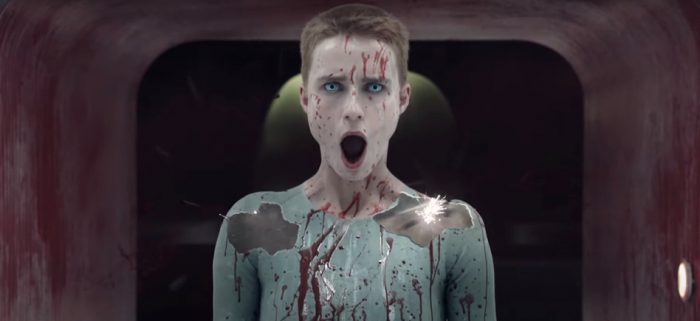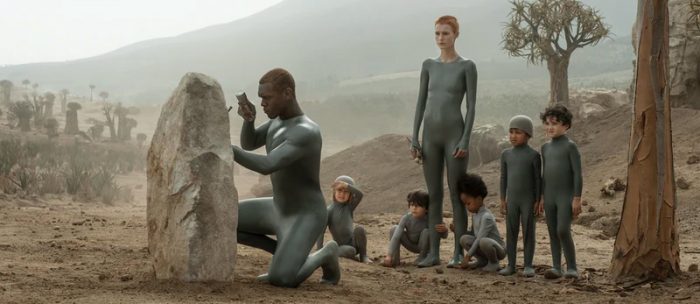
Raised by Wolves is a hardcore slice of science-fiction. From showrunner Aaron Guzikowski and director Ridley Scott, the series effortlessly blends thought-provoking drama and the fun of watching androids obliterating humans with the awesome power of their voice. It’s a show that doesn’t feel alien to Scott’s own sci-fi universes. Consider Raised by Wolves to be Blade Runner or Alien‘s cool cousin.
The epic series began as a spec script from Guzikowski, who generally writes movies, not shows, with the exception of The Red Road. The screenwriter’s breakout script was Prisoners, which caught the eye of Mark Wahlberg and led to Guzikowski’s earliest writing gigs, including Contraband. Guzikowski’s most ambitious project, without question, is Raised by Wolves. It’s epic in scope, although not without intimacy.
When writing the series, Guzikowski was listening to “a ton of John Carpenter,” the Nosferatu score, and “a lot of ’70s Tangerine Dream,” and it shows in the series. Recently, the showrunner told us about the experience of crafting his immersive sci-fi series with Sir Ridley Scott.
This show is very elegantly dense.
Well, that’s good to hear. It’s definitely a very layered cake. There’s definitely a lot in there. There’s a lot of calories in that meal. Good calories. Good, healthy calories. If you just watched one a week, I think you’d be full, you’d be happy. But not to say you can’t just go nuts and binge the whole thing too, and then you’ll be sick, but happy and fulfilled.
[Laughs] With a world this big, where do you begin cracking the story?
I think for this show, it’s very much the family and these two androids, and that’s really the core of what’s eventually going to grow to become this atheistic colony. We are dealing with all of these big elements, populating an entire planet, restarting human civilization, but we start from the point of view of one child, one human kid, one boy on this planet as his last human sibling is dying off, and he’s being left alone with two beings that he’s well aware of the fact that they’re not humans like him. He may be the last. It’s just starting from that perspective, that kind of empty, “What now?” But throughout it all, we’re going to see it through the lens of this family. As the board gets filled up over time, I want to maintain that perspective, the intimacy that we created.
How about the rules of the world?
Well, I started with art. With the rules, I’m starting with where we’re at now and trying to extrapolate it a little bit, and then also getting into the visual concepts and the feeling I was looking for with a lot of these stories, which is the ancient feeling like the old Grimm’s Fairy Tales and the Old Testament stories or Greek myths. I didn’t want to directly crib those stories, but I wanted them to have those elements. I think it just touched on some genetic trigger we have built inside of us, some of these weird little fairytale elements.
When you write artificial intelligence, how much do you go off of today’s science or using the imagination?
I think you try and do a little bit of both. I think you have to use your imagination. I think Arthur C. Clarke once said any sufficiently advanced technology, it’s going to look like magic when you’re first encountering it. Plus, we’re talking about 120 years in the future. However these androids are going to manifest is beyond many of our points of reference. So you’re trying to look at other things. Like, people who are on the spectrum have different ways of interacting with their environment, taking stuff like that. Also, taking attributes from animals. I think the idea that androids might have a lot of commonality with animals, in some ways more so than they’ll have with us, at least at first, in that I think there will be a lot of those characteristics built into them, all of that good stuff.

Raised by Wolves then, was that the first title you had in mind?
Actually, this was always the title. I was definitely very, very keen on holding onto the title because it is all about creators and their creations. It’s also about that uncomfortable relationship between them. I think with sci-fi shows, especially, it’s hard with titles because there are certain titles that have been used so many times because they’re appropriate and they apply, like Genesis or whatever it is. I always feel like I can see a giant shelf of Blu-rays and they all say all these common titles.
It’s funny how this show feels like such a continuation of ideas in Ridley Scott’s past work. Even before he was involved, did you think you were playing in his sandbox a little?
Sure. I was hugely influenced by him growing up. I still have the Xenomorph toy my parents bought me when I was five that came out in the late ’70s. I still have it, and I was obsessed with it. I watched Blade Runner in my basement repeatedly. I was just completely obsessed with all that stuff. His aesthetic, his take on science fiction and artificial intelligence specifically was a huge influence.
The whole concept that an android could be made of fleshy materials like we are, after seeing the first Alien movie, that really blew me away. That idea that an android doesn’t have to be made of metal, it doesn’t have to look like an android, and making me think more about, well, how different am I from that? Because we’re really just made of different materials, but what really makes us special? What creates consciousness and all that good stuff? It was all definitely in my head. Then meeting and working with him so closely on this, it was just a dream come true. He was so involved and just so excited to bring this thing to life, so it was great.
What were some ideas or scenes that seeing him execute with his eye was just a complete thrill?
There were so many, really. I think down to the birth, the two androids were artificially delivering the babies who were brought up in the artificial wombs there and the way that plays out and the way he directed that. Obviously, the massacre on the ark, which I knew it could go so many different ways. I knew he was going to have an awesome take on it. All of the practical effects that he employed along the way, which I always love, especially when Amanda’s walking down that white hallway. Ridley had these big bags of blood we had rigged, hanging down from the ceiling every five feet. They would just explode on a timer as she walked down the hall.
Wow. So that wasn’t CG?
Yeah, no, it wasn’t. I mean, some of it was CG, but they also had the real blood exploding to really get that effect. It was just awesome. When we were doing all of the flashback stuff, with all the combat scenes in Boston, that was real stuntmen lighting themselves on fire, real explosions, and buildings shaking. He just goes for it. He doesn’t mess around. He’s shooting with four cameras at a time minimum. He’s a master. It was just so great because he was just so giddy about it. He was so excited just to do it. The guy is a machine. He was so inspiring.
He shows the beauty and horror of artificial intelligence. Did you two talk a lot about your own ideas about artificial intelligence, the good and the bad?
I think we both have a lot of respect for it. I think we also know enough to know that predicting how it’s going to really play out is a fool’s errand, but at the same time, huge respect for what could potentially go wrong. It’s understanding, too, that it’s going to be something that’s so beyond us, the whole notion of us trying to extrapolate what it will mean if it takes over, what will it do? I mean, if the whole singularity does take place, it’s such a question mark. I think we have just respect for it, I guess.
When it comes to the science of the show, how much did you want to root it in real science rather than science fiction?
Honestly, all of it. When we’re talking about these supersonic technologies, using sound as a weapon, that’s something people are working on now. That stuff’s real. Not to the extent that you’d see on the show, but that’s a concept that some maniac is working on somewhere, and the idea of using sound and light, really turning the human senses against us, sound, sight, smell, touch. All of this stems from using weaponry to undermine those human sensory apparatus to wreak havoc.
How much was the ark, the men and women on it, influenced by real religions and societies?
I knew I wanted to have this story that one religion was going to achieve total primacy on the planet Earth and wipe out all other competing religions, and trying to figure out how to do that in the story. In my research, I found this ancient Roman mystery religion [mitharism] that involves all of these secret rights and whatnot that most which have been lost. So, to me, that felt like a really good thing to pull from our true history, but because it has all this ambiguity, you can put it into the story and organically fill in a lot of the blanks with this mythology as it applies to the show.
I think it’s just a fascinating religion in the sense that in a lot of ways it has to do with space. There were all these sorts of astrological symbols on all of their temples, and they thought it had to do with that. It had to do with stories of the constellations. But it really, it was about the stars themselves and the fact that they’re removing this thing called the procession of the equinoxes. It’s really like a star map that they were drawing on all of their underground temples.
So this is a real thing. It just helps me too, to answer, what if? What does this mean? I think you combine that real-world research with the story that you’re creating alongside it, and eventually, they hopefully start talking to each other.
There’s a lot in this show, like the depiction of religion, you rarely see in major movies. As someone who writes movies, what were some creative freedoms or liberties you felt with Raised by Wolves that are not typical in film?
I think you obviously have the luxury of a lot more time to tell your story, so you can get into a lot more nuance. I think it’s harder in a film when you only have two hours to get into some heavy stuff to really deal with it in the way it needs to be dealt with. There just isn’t really that much time unless the entire film is about that. And those kinds of films, that’s going to be a hard sell.
Obviously, TV’s a little bit more like a novel and you can really drill into these sorts of concepts that just are a little bit too complicated to really get far enough down the field inside of two hours, which is so freeing and it’s been so great because I love that, but I also love all of the things you can do in movies, all of the spectacle and the awe, and all that amazing stuff visually you can conjure up. It’s trying to get that best of both worlds in terms of those two things.

Did you ever seriously consider writing Raised by Wolves as a movie?
It was never seriously considered. I, myself, I think at times wondered. I was never really sure. I’m like, “I don’t know, this is pretty out there. I don’t know if this show’s ever going to get made.” The question was also, well, who’s going to do this? How are we going to get this executed on a level where it’s not going to fall apart?
At times I considered, well, maybe I could take the first two episodes and turn it into a movie, but it was enough to be altered. I think at the end of the day, like I was saying before, you’d have to kind of lean in more to the cinematic aspects and the shock and awe of it all. I think you wouldn’t be able to get away with as much mystery because obviously, you got to tie all that stuff up at the end of the two hours. It was considered, but thankfully, that’s not how we did it.
When did you and Ridley Scott first discuss the show?
I think it was in 2017, I believe. Thereabouts.
A show of this scale, what’s your schedule like? What’s the timeline to write, shoot, and edit a show like this?
It’s a bit of a marathon. Well, obviously, it all begins in the writers’ room. I had written a lot of stuff before I had sold the show. I had to have it all worked out in order to sell it, in order to get them to have faith in this idea, that I had an ending and all. So getting through that stage and then opening up a writers’ room, hiring a bunch of great writers, and just getting to work.
With production, we didn’t have that much time. I think once we really got involved, everything started moving very quickly. I had the season worked out, but we had to write all the episodes and get it all done. At the same time, we were prepping to shoot Ridley’s episodes in South Africa. We were still obviously still in the process of writing the second half of the season when we started production on the first half. I went down to South Africa while Ridley shot, so I got to work with him on the pilot.
Then after that, I would cycle back and forth from LA and South Africa. I was doing the writing and then we started getting to post-production. It’s an interesting thing where these three stages are going at the same time, like the writing, the shooting, and the editing, but all for different episodes. I mostly worked in features, too. It’s a bit surreal.
What was one of the tougher days in the writers’ room?
It’s hard to say. I think looking back on it, my mind throws all that stuff out. It only holds onto the victories and throws out all the head banging against the wall stuff. Probably at the ending, the final episode, there were definitely many, many versions of that. It took a lot of just trial and error and trying to figure out what the most effective way to go out with it. I think it was mostly the ending and all the various ways that could have gone. I mean, we knew what season two, how that could be built, but still, it was a lot of going around and around on that.
How many seasons do you have in mind?
When I sold the show, I had a five-season plan. I think there are certain things I needed to know. Certain things are not going to change, but I think other things are. I think it’s important to have a map, obviously, and I think the big roads, really big highways on that map aren’t going to change. It’s part of the overall design. As you get into it, you can start to vary within that contained map. As you’re writing it, things just present themselves to you. Or you start shooting and you see someone on screen and you’re like, “Holy shit, we got to write more for that person.”
Have you started writing season two yet?
Yep. I’m thinking about it. I’m definitely in there and generating ideas. So hopefully, if given the opportunity, there would be nothing I’d like better than to keep on going.
The post ‘Raised by Wolves’ Showrunner Aaron Guzikowski on Crafting an Ambitious Science Fiction World [Interview] appeared first on /Film.
from /Film https://ift.tt/3d6N9qY
